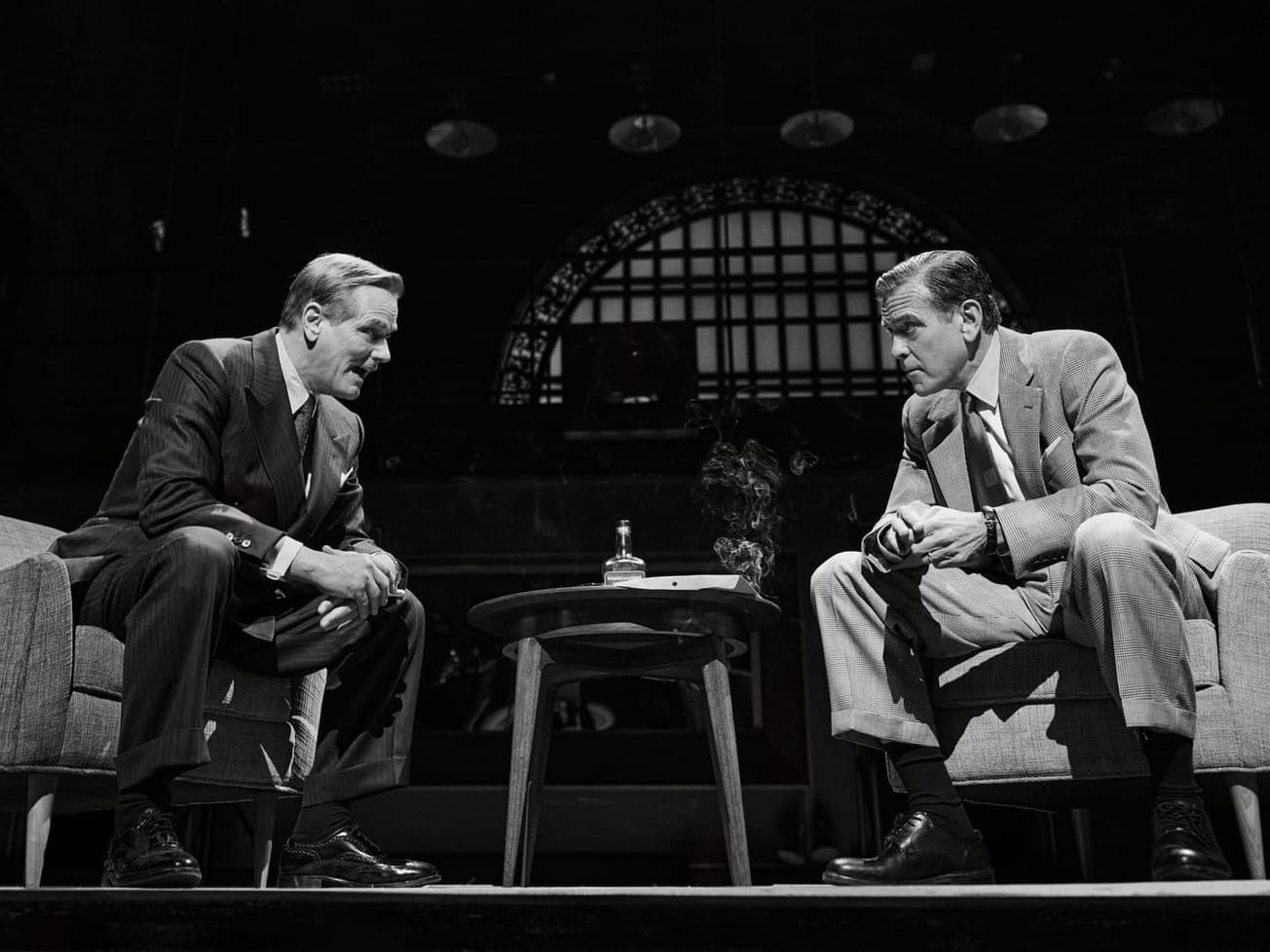There is heartbreak in the timing of the death of Stephen Sondheim, the composer and lyricist who came to tower above all others in the last 50 years of Broadway theater.
His death preceded by a little more than a week the opening of a highly anticipated Broadway revival of “Company,” his 1970 musical, after a pandemic delay. And the new movie version of “West Side Story,” the 1957 musical for which he wrote the lyrics, also pandemic-delayed, is about to hit movie screens.
For once, Sondheim was, well, late for the party, or rather unable to attend. For most of his career, he was arriving at the party before anyone knew there was a party to attend. By which I mean Sondheim — and his collaborators — had the peculiar, sometimes frustrating genius of always being a step, or a mile, ahead of their time, finding musical theater material in places no one would think of looking for it. And often, critics and the public were confused by what was found.
A Bergman movie as a musical? A bit of British grand guignol, about a bloodthirsty barber and his dithering pie-making cohort, transformed into a combination of grand opera and music-hall comedy. A bifurcated exploration of the hard work of making art inspired by a Georges Seurat painting. And perhaps most audaciously, a musical delineating in differing musical styles the warped psyches of the most famous presidential assassins.
You can say, without much likelihood of strenuous denial, that no other figure in musical theater history would have the capacious, even perverse, imagination to venture on any, not to say all, of these projects. In doing so Sondheim and his collaborators created a canon of musical theater that has grown in stature — momentously, I think it’s fair to say — since the years in which they first premiered.
Which brings me back to the new “Company” and the new “West Side Story.” Sondheim’s death just before their arrival may cause some sadness, but there is cause for celebration, too. More than 60 years after its debut, “West Side Story” has become a cultural landmark whose depiction of violent divisions in American society seems prescient today — and has attracted some of the best artists in their fields, director Steven Spielberg, choreographer Justin Peck and playwright Tony Kushner. And “Company,” long after it opened to mixed reviews, has been reimagined for the new century, with a woman in the central role.
It’s tempting, in writing posthumous assessments, to concentrate on past achievement. But what is most remarkable about Sondheim’s oeuvre is that, unlike much of the work of even his great forebears, from Jerome Kern to Rodgers & Hart to Cole Porter to Frank Loesser and Rodgers & Hammerstein, it retains an ever-present vitality. His musicals speak to us today with a voice no less complex, insightful and challenging than they did when they were created. Perhaps this is because even when moving between periods and styles and subjects, they were fundamentally constructed from the raw material of life, not the standard tropes of showbiz, and life doesn’t really change much.
When we see Sondheim musicals today, they do not, as many revivals do, inspire mere innocuous affection. They invite argument, they stoke ambivalence, and often leave you with the sometimes bitter taste of newly acquired — or affirmed — knowledge of the complexities, and deficiencies, of human nature and experience. “Every Day a Little Death,” to take one of his most grimly gimlet-eyed songs, presents life as an endless series of small cuts to the heart and soul. Even “Into the Woods,” a scrambling of various fairy tales, suggests that there is no respite even in the world of childhood fantasy. “Sometimes people leave you/Halfway through the wood/Others may deceive you,” sings Cinderella — of all fairy-tale characters! And yet the darkness of his worldview was dappled by hope and a belief in at least the possibility of connection: The forthright title of that very song is “No One Is Alone.”
To look back is to realize that Sondheim and his collaborators’ experiments didn’t just push the Broadway musical into unexpected directions and untrammeled territory, although they did. With the perspective of history, we can claim, perhaps with a soupçon of hyperbole, that they saved the art form from an early decline into decadence, and senescence. (Not that, with jukebox musicals endlessly proliferating, there isn’t a whiff of decadence wafting through Times Square.)
Although he wrote the lyrics for “Gypsy” and “West Side Story,” when Sondheim had the clout to insist on composing both music and lyrics in the 1960s and 1970s, the Broadway musical was, by most accounts, floundering toward irrelevance. The traditional shows, usually enshrining love stories and happy-ever-after tales at their center, and cheerily pandering to the desire of audiences for easy escape, were becoming increasingly marginal in an era roiled by social conflict.
Sondheim, under the strict tutelage of his mentor, Oscar Hammerstein, took an analytical approach to the combination of song and story, and brought a math-and-puzzle-lover’s methodical precision to writing lyrics. But he and his collaborators seemed to recognize that the subject matter of the musical was of almost equal significance. While contemporaries continued to trade in reliable boy-meet-girl formats, Sondheim and Co. reinvented the form by diving into new territory, new points of view, new musical styles, endless variegations of emotion. (I point again to his collaborators because the man himself, despite the swelling of singular acclaim for him over the years, always showed a gracious humility in crediting them – although it was less humility than a sharp intelligence and a thorough knowledge of the process of making a musical.)
Whether Sondheim realized the musical theater was potentially facing a dead end, to become a form memorialized, as in opera, by endless revivals of classic favorites, I couldn’t say. But his 1971 musical “Follies” — in my view his greatest, after “Sweeney Todd” — seemed to suggest that he did. Equally elegiac and acerbic — although perhaps more the latter — its story, centering on the unhappy marriages of two couples who met when the women were chorus girls during the so-called Golden Age of Broadway, was both steeped in wryly affectionate appreciation of the music of the era, but also illuminated how the façade that had held up the Broadway musical as an exemplar of American culture was in the process of decay.
And so, despite a conspicuous lack of commercial success, he and those collaborators — notably George Furth, John Weidman, Harold Prince and James Lapine — turned away from the past and created a new future. What they could not have imagined, but what it is immensely gratifying to know that Sondheim lived to see, is how the forest of seeds they planted would indeed fructify the musical theater they loved so well.
The list of musical theater artists inspired by Sondheim’s work would include just about everyone who ignored the siren call of pop and rock and pursued careers in an always tenuous field. Sondheim was so influential that sometimes, as a critic, I’d go a stretch of months hearing seemingly nothing but valiant, unavailing imitations of his work.
But it is not unreasonable to suggest that the invigorating stream of fresh, adventurous Broadway musicals in the past decade or so — to name a few, “Spring Awakening” (which Sondheim, oft-cranky, was sniffy about), “Caroline, or Change,” “The Light in the Piazza,” “Hamilton,” “Natasha, Pierre and the Great Comet of 1812” — owes its arrival to the path forged by Sondheim. His protean talent formed a sturdy bridge between generations, between the musicals he admired from his forebears, the musicals he created, and the musicals inspired by his unique contributions to the form — often with his enthusiastic support of their creators.
So while we can memorialize the man and the artist, and mourn the loss of one of the theater’s most singular talents, the work continues to sing for itself. The opening night of “Company” should be one to remember. “Assassins” continues its sellout run at the Classic Stage Company. “West Side Story” will soon greet new generations of moviegoers. Time for a toast, or two, or three, and — why not? — one for Mahler.
Correction: A previous version of this article misstated the first name of John Weidman. It has been corrected in the article.


























































